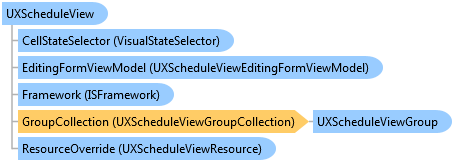

| Intersoft.Client.UI.ScheduleView Namespace : UXScheduleView Class |

<ContentPropertyAttribute("Views")> <TemplatePartAttribute(Name="NavigationPane", Type=Intersoft.Client.UI.Aqua.UXResizablePane)> <TemplatePartAttribute(Name="HeaderPresenter", Type=System.Windows.Controls.ItemsControl)> <StyleTypedPropertyAttribute(Property="ScrollBarStyle", StyleTargetType=Intersoft.Client.UI.Controls.UXScrollBar)> <StyleTypedPropertyAttribute(Property="ResourcesListStyle", StyleTargetType=Intersoft.Client.UI.ScheduleView.UXScheduleViewResourcesList)> <TemplatePartAttribute(Name="Calendar", Type=Intersoft.Client.UI.ScheduleView.UXScheduleViewCalendar)> <StyleTypedPropertyAttribute(Property="CalendarStyle", StyleTargetType=Intersoft.Client.UI.ScheduleView.UXScheduleViewCalendar)> <TemplatePartAttribute(Name="ResourceList", Type=Intersoft.Client.UI.ScheduleView.UXScheduleViewResourcesList)> <TemplatePartAttribute(Name="AddButton", Type=System.Windows.Controls.Primitives.ButtonBase)> <StyleTypedPropertyAttribute(Property="HeaderButtonStyle", StyleTargetType=Intersoft.Client.UI.ScheduleView.UXScheduleViewHeaderButton)> <StyleTypedPropertyAttribute(Property="NavigationPaneStyle", StyleTargetType=Intersoft.Client.UI.Aqua.UXCollection.UXNavigationPane)> <StyleTypedPropertyAttribute(Property="ContextMenuStyle", StyleTargetType=Intersoft.Client.UI.ScheduleView.UXScheduleViewContextMenu)> <StyleTypedPropertyAttribute(Property="EventDetailStyle", StyleTargetType=Intersoft.Client.UI.ScheduleView.UXScheduleViewEventDetail)> Public Class UXScheduleView Inherits Intersoft.Client.Framework.ISContentControl Implements Intersoft.Client.Framework.IControl, Intersoft.Client.Framework.IFramework, Intersoft.Client.Framework.ILicensing
Dim instance As UXScheduleView
[ContentPropertyAttribute("Views")] [TemplatePartAttribute(Name="NavigationPane", Type=Intersoft.Client.UI.Aqua.UXResizablePane)] [TemplatePartAttribute(Name="HeaderPresenter", Type=System.Windows.Controls.ItemsControl)] [StyleTypedPropertyAttribute(Property="ScrollBarStyle", StyleTargetType=Intersoft.Client.UI.Controls.UXScrollBar)] [StyleTypedPropertyAttribute(Property="ResourcesListStyle", StyleTargetType=Intersoft.Client.UI.ScheduleView.UXScheduleViewResourcesList)] [TemplatePartAttribute(Name="Calendar", Type=Intersoft.Client.UI.ScheduleView.UXScheduleViewCalendar)] [StyleTypedPropertyAttribute(Property="CalendarStyle", StyleTargetType=Intersoft.Client.UI.ScheduleView.UXScheduleViewCalendar)] [TemplatePartAttribute(Name="ResourceList", Type=Intersoft.Client.UI.ScheduleView.UXScheduleViewResourcesList)] [TemplatePartAttribute(Name="AddButton", Type=System.Windows.Controls.Primitives.ButtonBase)] [StyleTypedPropertyAttribute(Property="HeaderButtonStyle", StyleTargetType=Intersoft.Client.UI.ScheduleView.UXScheduleViewHeaderButton)] [StyleTypedPropertyAttribute(Property="NavigationPaneStyle", StyleTargetType=Intersoft.Client.UI.Aqua.UXCollection.UXNavigationPane)] [StyleTypedPropertyAttribute(Property="ContextMenuStyle", StyleTargetType=Intersoft.Client.UI.ScheduleView.UXScheduleViewContextMenu)] [StyleTypedPropertyAttribute(Property="EventDetailStyle", StyleTargetType=Intersoft.Client.UI.ScheduleView.UXScheduleViewEventDetail)] public class UXScheduleView : Intersoft.Client.Framework.ISContentControl, Intersoft.Client.Framework.IControl, Intersoft.Client.Framework.IFramework, Intersoft.Client.Framework.ILicensing
[ContentPropertyAttribute("Views")] [TemplatePartAttribute(Name="NavigationPane", Type=Intersoft.Client.UI.Aqua.UXResizablePane)] [TemplatePartAttribute(Name="HeaderPresenter", Type=System.Windows.Controls.ItemsControl)] [StyleTypedPropertyAttribute(Property="ScrollBarStyle", StyleTargetType=Intersoft.Client.UI.Controls.UXScrollBar)] [StyleTypedPropertyAttribute(Property="ResourcesListStyle", StyleTargetType=Intersoft.Client.UI.ScheduleView.UXScheduleViewResourcesList)] [TemplatePartAttribute(Name="Calendar", Type=Intersoft.Client.UI.ScheduleView.UXScheduleViewCalendar)] [StyleTypedPropertyAttribute(Property="CalendarStyle", StyleTargetType=Intersoft.Client.UI.ScheduleView.UXScheduleViewCalendar)] [TemplatePartAttribute(Name="ResourceList", Type=Intersoft.Client.UI.ScheduleView.UXScheduleViewResourcesList)] [TemplatePartAttribute(Name="AddButton", Type=System.Windows.Controls.Primitives.ButtonBase)] [StyleTypedPropertyAttribute(Property="HeaderButtonStyle", StyleTargetType=Intersoft.Client.UI.ScheduleView.UXScheduleViewHeaderButton)] [StyleTypedPropertyAttribute(Property="NavigationPaneStyle", StyleTargetType=Intersoft.Client.UI.Aqua.UXCollection.UXNavigationPane)] [StyleTypedPropertyAttribute(Property="ContextMenuStyle", StyleTargetType=Intersoft.Client.UI.ScheduleView.UXScheduleViewContextMenu)] [StyleTypedPropertyAttribute(Property="EventDetailStyle", StyleTargetType=Intersoft.Client.UI.ScheduleView.UXScheduleViewEventDetail)] public ref class UXScheduleView : public Intersoft.Client.Framework.ISContentControl, Intersoft.Client.Framework.IControl, Intersoft.Client.Framework.IFramework, Intersoft.Client.Framework.ILicensing
UXScheduleView is a full-featured scheduling control that combines rock-solid architecture with superior user experiences. With its extensible architecture, UXScheduleView enables you to define any number of calendar views with the simplicity of XAML markup declaration. You can also create your own custom views that leverages many of the built-in features like calendar navigation and automatic view synchronization feature, and consume the custom view in a single XAML declaration.
To learn more about UXScheduleView see UXScheduleView Overview.
UXScheduleView provides a flexible way to display a collection of data in resource and time dimension. You can choose between UXScheduleDayView, UXScheduleWeekView, UXScheduleWorkWeekView and UXScheduleMonthView to display your collection of data. Every view has its own unique behaviors to display data which can be used individually or integrated in UXScheduleView. Furthermore, you can also create a custom view to be integrated to UXScheduleView by creating a new class that derives from UXScheduleViewBase.
| Defining Views |
Copy Code
|
|---|---|
<Intersoft:UXScheduleView> <Intersoft:UXScheduleDayView/> <Intersoft:UXScheduleWorkWeekView/> <Intersoft:UXScheduleWeekView IsActive="True"/> <Intersoft:UXScheduleMonthView/> </Intersoft:UXScheduleView> |
|
To learn more how to create custom view, see How-to: Create And Integrates Custom View to UXScheduleView.
System.Object
System.Windows.DependencyObject
System.Windows.UIElement
System.Windows.FrameworkElement
System.Windows.Controls.Control
System.Windows.Controls.ContentControl
Intersoft.Client.Framework.ISContentControl
Intersoft.Client.UI.ScheduleView.UXScheduleView
Target Platforms: Windows 7, Windows Vista SP1 or later, Windows XP SP3, Windows Server 2008 (Server Core not supported), Windows Server 2008 R2 (Server Core supported with SP1 or later), Windows Server 2003 SP2